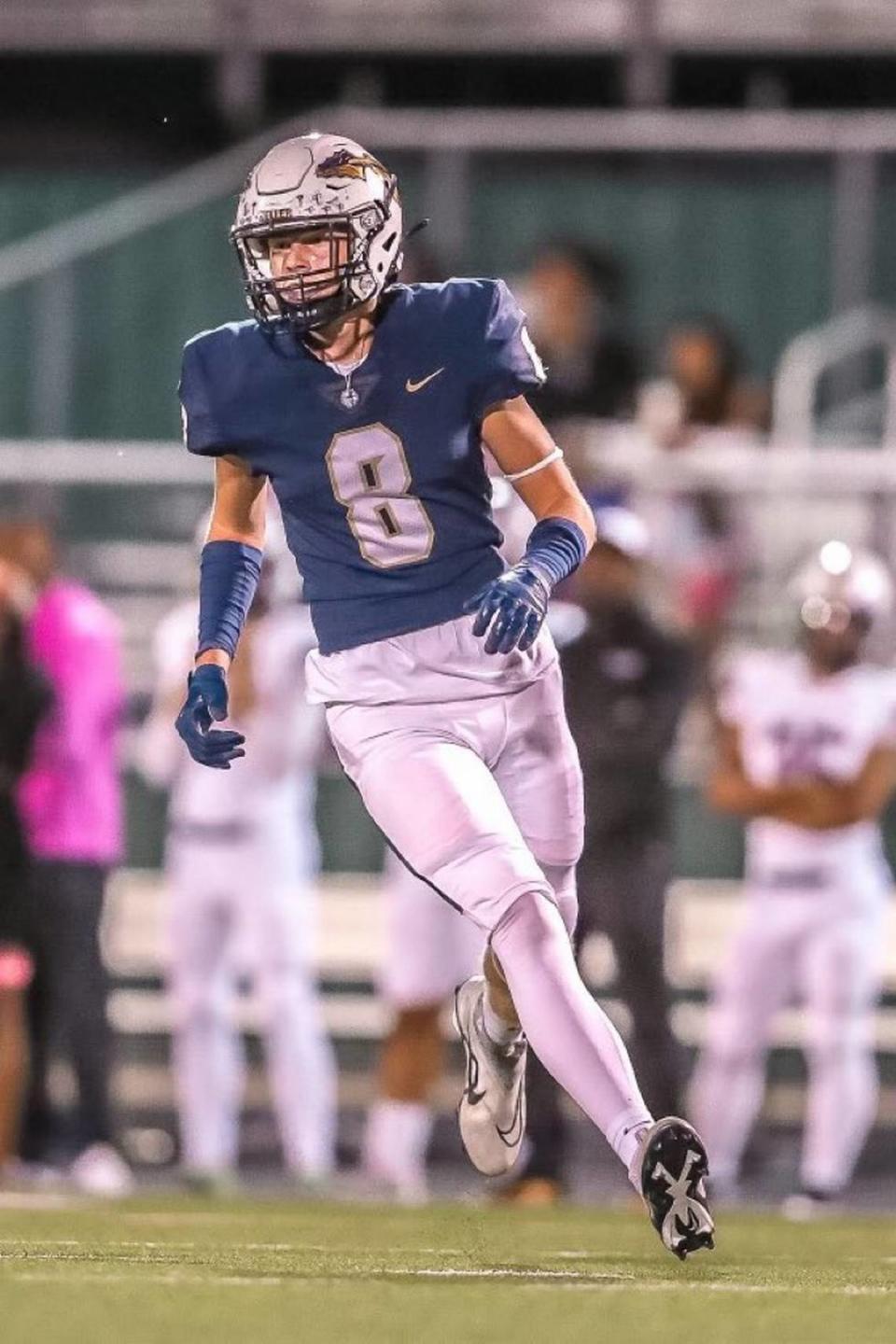Keller football’s Parker Ireson tore his ACL. Now, he’s on the long road to recovery
The Keller Indians were playing at Plano West in the second game of the young, 2023 season.
Parker Ireson, a 2022 All District 4-6A second team tight end who also plays wide receiver, was set to have a key role in the Indians’ offense. He had received offers from four programs: Dartmouth, Louisiana Monroe, Air Force and Arkansas State.
#AGTG after a great conversation with @coachskene3 i’m blessed to receive an offer from @AF_Football @CoachWesCope @CoachTKeller @CoachBRob5 @CoachRob99 pic.twitter.com/Nsjo2EDwwo
— Parker Ireson (@ParkerIreson) May 25, 2023
The next chapter of his athletic career loomed, but Ireson still had his senior season in front of him. In the beginning, it was off to a strong start.
The 6-foot-4, 215 pound senior caught a 3-yard touchdown from quarterback Beckham Robinson to open the scoring, giving Keller an early lead over Plano West.
“I was doing great,” Ireson said.
The touchdown, however, was the last of Ireson’s high school football career.
The Indians were running a “normal play” in the second quarter.
“I was lined up at slot, and I was going for a block,” Ireson said. “I wasn’t fully there. As I was starting to decelerate, I just reached my knee out too far. The whole thing just popped.”
Ireson immediately knew something was wrong.
“My first thought was ACL,” Ireson said. “I was just hoping it wasn’t because I know it’s pretty much the end of the season.”
Although Ireson held out hope, he understood it was likely a major knee injury. His first instinct was correct.
The ACL was torn, and his season with Keller football was over in an instant.
Ireson said the positioning of his knee caused the injury, and added the “really bad” turf didn’t help.
The long road to recovery
Ireson’s playing career with Keller, the Star-Telegram’s No. 4 ranked Fort Worth-area team in Class 6A, is over.
His football career, however, is still alive and well. Ireson is expected to make a full recovery and said he’s hoping to be back on the field in six or seven months.

In three weeks, he’ll have surgery to reconstruct his ACL. For now, Ireson is focused on physical therapy and preparing for college.
He’ll choose where he’ll play football at the next level “soon” and is currently visiting schools.
As an Indian, Ireson helped Keller secure two playoff victories against Euless Trinity and Midland Legacy. He said he enjoys the process of competing at a high level more than the winning moments.
“I’m most proud of the hard work I put in with all my teammates,” Ireson said. “The offseason. All the grind. I love the season, don’t get me wrong. That off the field work that you put in, that’s what I love the most about football. Just hanging out with the friends and getting to know each other on and off the field.”
Even though he’s forced to stay on the sidelines, Ireson still goes to practice at 6 a.m. and after school every day to support his teammates. He said he wants to stay around a football environment to learn as much as possible.
“I still have quite a lot of time before I’m on the field again,” Ireson said. “So, I just got to take it slow. I don’t want to push myself past the limit that I’m capable of, and want to make sure that I come back fully healthy.”
The ACL tear: knowing the risks
Ireson is one of many athletes who have suffered season ending injuries due to the ACL tear.
Dr. Matthew Tao, a knee injury expert at University of Nebraska Medical Center, said middle school and high school athletes are more susceptible to ACL injuries, as their physical abilities aren’t fully developed.
With cutting, pivioting and other quick movements, any athlete can potentially suffer an ACL tear, which is a non contact injury. There’s no way to fully prevent the ACL tear from occurring, and it can happen to anyone.
There are, however, ways to lessen the odds. Tao referenced the FIFA 11+ as an effective warm up method that is proven to reduce injuries.
“They require a fair amount of dedication,” Tao said, adding the “team effort” routine must be performed consistently to see results.
Tao said work in the weight room is important to prevent injuries, mentioning it’s important to lift to ensure all muscle groups are well balanced. He specifically mentioned being strong in one area helps prevent ACL tears.
“If you look at ACLs specifically, having increased quad strength is protective,” Tao said.
The vast majority of athletes who tear an ACL undergo surgery. Tao said athletes wanting to make a full recovery should focus on three things: strength, conditioning and completing all physical therapy sessions.
“That’s where people probably don’t do as well as they should,” Tao said. “The physical therapy side of it is just as important, if not more important, than the surgery itself.”
Tao said athletes going through ACL recovery should “objectively measure their strength” to know the right time to return from surgery to the field, even though the knee may be feeling better. At most, a full, proper recovery can take up to 12 months, but it depends on the situation.

